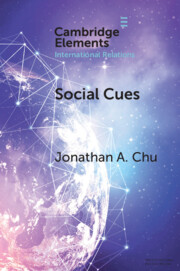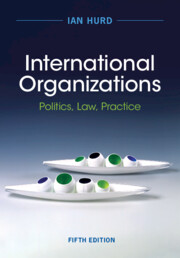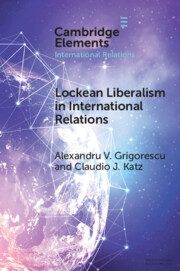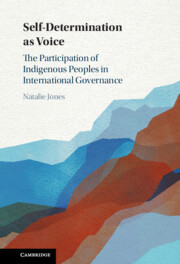570 results

Social Cues
- How the Liberal Community Legitimizes Humanitarian War
-
- Published online:
- 03 March 2025
- Print publication:
- 27 March 2025
-
- Element
-
- You have access
- Open access
- HTML
- Export citation
12 - International Organizations and Peaceful Change
- from Part III - Practice
-
-
- Book:
- International Organizations and Peaceful Change in World Politics
- Published online:
- 30 January 2025
- Print publication:
- 06 February 2025, pp 273-298
-
- Chapter
- Export citation
Do the Bretton Woods Institutions promote economic transparency?
-
- Journal:
- Political Science Research and Methods , First View
- Published online by Cambridge University Press:
- 24 October 2024, pp. 1-19
-
- Article
-
- You have access
- Open access
- HTML
- Export citation
What investors want from whom: international organizations and the International Association for the Promotion and the Protection of Private Foreign Investments (APPI) 1958–1974
-
- Journal:
- Business and Politics / Volume 27 / Issue 1 / March 2025
- Published online by Cambridge University Press:
- 16 September 2024, pp. 47-68
-
- Article
-
- You have access
- Open access
- HTML
- Export citation
Are Goodwill Ambassadors Good for Business? The Impact of Celebrities on International Organization Fundraising
-
- Journal:
- Journal of Experimental Political Science , First View
- Published online by Cambridge University Press:
- 01 August 2024, pp. 1-13
-
- Article
-
- You have access
- Open access
- HTML
- Export citation
1 - Introduction to International Organizations
-
- Book:
- International Organizations
- Published online:
- 17 May 2024
- Print publication:
- 06 June 2024, pp 1-16
-
- Chapter
- Export citation

International Organizations
- Politics, Law, Practice
-
- Published online:
- 17 May 2024
- Print publication:
- 06 June 2024
-
- Textbook
- Export citation
Rewriting the law of international organizations: Whither the Asia Pacific?
-
- Journal:
- Leiden Journal of International Law / Volume 37 / Issue 3 / September 2024
- Published online by Cambridge University Press:
- 09 May 2024, pp. 694-715
-
- Article
-
- You have access
- Open access
- HTML
- Export citation

Lockean Liberalism in International Relations
-
- Published online:
- 13 March 2024
- Print publication:
- 04 April 2024
-
- Element
- Export citation
Race, Representation, and the Legitimacy of International Organizations
-
- Journal:
- International Organization / Volume 78 / Issue 3 / Summer 2024
- Published online by Cambridge University Press:
- 14 November 2024, pp. 575-599
- Print publication:
- Summer 2024
-
- Article
-
- You have access
- Open access
- HTML
- Export citation
5 - Moving beyond Mandates
-
-
- Book:
- International Public Administrations in Environmental Governance
- Published online:
- 22 February 2024
- Print publication:
- 29 February 2024, pp 107-130
-
- Chapter
-
- You have access
- Open access
- HTML
- Export citation
Demystifying autonomy: tracing the international law origins of the EU principle of autonomy – ERRATUM
-
- Journal:
- German Law Journal / Volume 25 / Issue 3 / May 2024
- Published online by Cambridge University Press:
- 02 February 2024, p. 551
-
- Article
-
- You have access
- Open access
- HTML
- Export citation
Incentivizing Responses in International Organization Elite Surveys: Evidence from the World Bank
-
- Journal:
- Journal of Experimental Political Science / Volume 12 / Issue 1 / Spring 2025
- Published online by Cambridge University Press:
- 26 January 2024, pp. 17-26
-
- Article
-
- You have access
- Open access
- HTML
- Export citation
1 - Participation in International Governance and the Logic of Self-Determination
-
- Book:
- Self-Determination as Voice
- Published online:
- 04 January 2024
- Print publication:
- 18 January 2024, pp 18-44
-
- Chapter
- Export citation
Erosion of International Organizations’ Legitimacy under Superpower Rivalry: Evidence on the International Court of Justice
-
- Journal:
- Canadian Journal of Political Science/Revue canadienne de science politique / Volume 57 / Issue 1 / March 2024
- Published online by Cambridge University Press:
- 18 January 2024, pp. 21-42
-
- Article
-
- You have access
- Open access
- HTML
- Export citation
Introduction
-
- Book:
- Self-Determination as Voice
- Published online:
- 04 January 2024
- Print publication:
- 18 January 2024, pp 1-17
-
- Chapter
- Export citation
2 - Finding Support for Indigenous Peoples’ Participation in the Sources of International Law
-
- Book:
- Self-Determination as Voice
- Published online:
- 04 January 2024
- Print publication:
- 18 January 2024, pp 45-80
-
- Chapter
- Export citation
Demystifying Autonomy: Tracing the International Law Origins of the EU Principle of Autonomy
-
- Journal:
- German Law Journal / Volume 25 / Issue 1 / February 2024
- Published online by Cambridge University Press:
- 12 January 2024, pp. 94-110
-
- Article
-
- You have access
- Open access
- HTML
- Export citation

Self-Determination as Voice
- The Participation of Indigenous Peoples in International Governance
-
- Published online:
- 04 January 2024
- Print publication:
- 18 January 2024
11 - The Consent of International Organizations in the Making of General and Conventional Rules of International Law
- from Part III - Subjects and Institutions of Consent
-
-
- Book:
- Consenting to International Law
- Published online:
- 23 November 2023
- Print publication:
- 07 December 2023, pp 251-273
-
- Chapter
- Export citation

